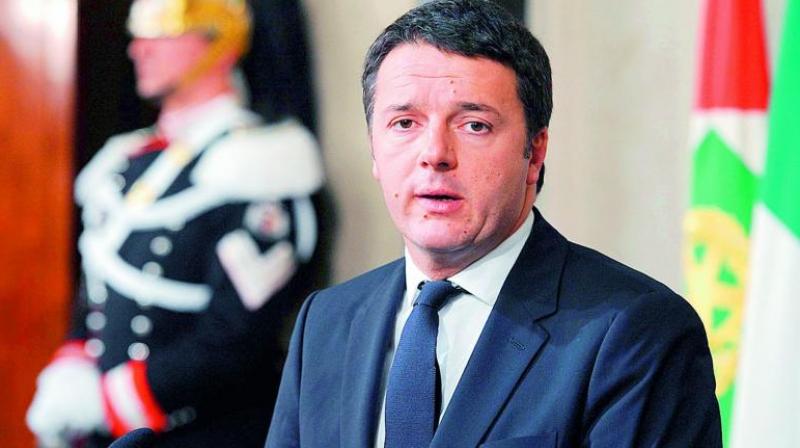Italy faces political, economic uncertainty after referendum

Milan: Italian voters dealt Premier Matteo Renzi a resounding rebuke by rejecting his proposed constitutional reforms, plunging Europe's fourth-largest economy into political and economic uncertainty Monday.
Renzi announced he would quit following Sunday's referendum vote, in which 60 percent of voters rejected his proposals and signalled they wanted a change in political direction. Renzi, who had boldly staked his political future on winning the referendum, was expected to hand in his resignation to President Sergio Mattarella later Monday.
The unexpectedly large margin of defeat with a robust voter turnout of 68.5 percent appeared to rule out any chance that Renzi would be offered another shot at forming a government. Analysts did, however, expect Mattarella to ask Renzi to stay on long enough to pass the new budget, with a target date of Dec. 23.
The vote energized the anti-establishment 5-Star Movement and the anti-immigrant Northern League, whose leader has allied himself with far-right figures in Europe including France's Marine Pen.
While Italy's opposition parties were united in antipathy for Renzi's policies and reform course, they have little else in common and have already begun vying to position themselves for a new election, although the timing of any vote remained unclear. Analysts expect that Mattarella will appoint a transition government to draft a new election law, with speculation centering on either Renzi's finance minister, Pier Carlo Padoan, or the president of the Senate, Pietro Grasso, to lead the effort.
But that course is already facing opposition.
Northern League leader Matteo Salvini called for an immediate election this winter "because real change happens only through electoral victory."
The current election law, which Renzi wanted to reform, would hand a huge bonus of seats to the lower house while maintaining a proportional system for the upper house, raising the potential for parliamentary gridlock.
With much wrangling ahead, the risk facing Italy is "a prolonged muddle-through period, the emergence of an ineffective, patched-up coalition government in the postelection phase and continuously poor economic performance," said Wolfango Piccoli, a political analyst at the Teneo Intelligence consultancy.
European partners sought to downplay the risk for the common euro currency and European unity.
"This is a crisis of government, not a crisis of state, and it's not the end of the West. But it's certainly not a positive contribution against the backdrop of the crisis in Europe," German Foreign Minister Frank-Walter Steinmeier said in Athens.
The EU finance commissioner, Pierre Moscovici, told reporters in Brussels that "I'm very confident in the capacity of the eurozone to resist all kind of shocks."
The main stock index in Milan was volatile. It opened down 2 percent, with many bank shares suspended due to excessive volatility, but recovered to trade down only 0.9 percent.
Investors had been anticipating Renzi's defeat for several days, and had sold off Italian stocks and bonds. Monday's sanguine market reaction can also be attributed to the fact that Italy's markets indirectly enjoy a big backstop from the European Central Bank.
The central bank for the 19-country eurozone is buying 80 billion euros ($85 billion) every month in bonds, including government debt, across the currency bloc. It is expected on Thursday to decide to extend that program beyond its current end date of March. The bond purchases aim to boost growth and inflation but also effectively help keep low government borrowing rates. That is crucial for Italy, which has a massive public debt load of 130 percent of GDP.
Italy's 10-year bond yield was stable at 2.03 percent on Monday. That's up from 1.65 percent last month but is still very low for a highly indebted country like Italy. It's also far short of the 7 percent rate that in 2012 had created fears that Italy might default and fall out of the euro.
Still, the result cast doubts on the ability of Italy's third-largest lender and the worst performer in last summer's EU stress test, Monte Paschi di Siena, to execute a rescue plan that includes a 5 billion euro market recapitalization. Advisers are meeting to discuss the vote's impact, according to Italian media. Italy's biggest bank, UniCredit, also is to present to analysts its new business plan next week in London.
Renzi swept into power 2 years ago on a pledge to dismantle the system, claiming the moniker of demolisher. His brash ways divided his own party, however, and his confidence was widely perceived as arrogance, even in other European capitals and especially in Brussels, where he had grown increasingly bold in pressing for flexibility on the budget.
"I lost and the post that gets eliminated is mine," Renzi said early Monday after the polls closed. "The government's experience is over."

